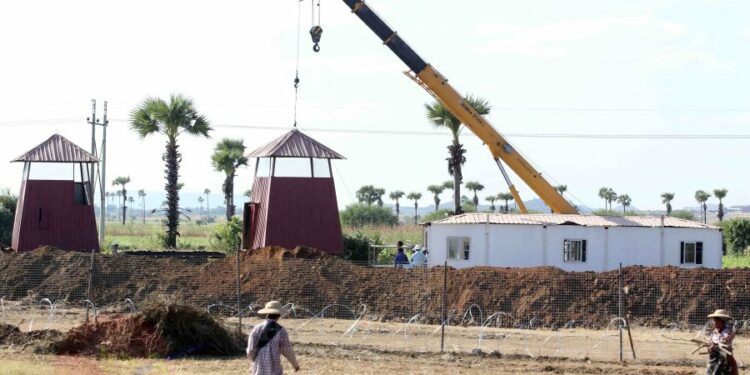Yangon — Villagers near a China-backed copper mining project in Salingyi Township, Sagaing Region, have agreed to relocate to a new site after years of disputes over compensation for confiscated land.
China Wanbao Engineering Company has been operating the controversial Letpadaung copper mine in partnership with the military-owned Union of Myanmar Economic Holdings Company (UMEHL) since 2010. Protests began in 2012 against the mine, with villagers saying it cost them their livelihoods and damaged the environment while demanding compensation.
In November 2012 more than 70 monks and around 10 civilians, who were peacefully protesting, were injured when security forces used highly toxic white phosphorus against them. In 2014 a female protester was shot dead by police.
Se Te villagers have agreed to move on condition that they receive the compensation they claim, said Sagaing Region municipal minister U Myint Kyi.
“When we made concessions, the farmers agreed to relocate. We have negotiated with the [Chinese] company to fulfill their demands where it is possible,” he said.
“We have also negotiated with the company to yield to the villagers if they don’t want to relocate to the proposed site and ask to move to another site,” he added.
Sagaing Region lawmaker Dr. Thein Naing said it took five years to agree a new site with the villagers.
“They said that they would agree if they received backdated compensation. It will be calculated from 2013. And there will be an additional payment considering currency depreciation,” said Dr. Thein Naing.
U Myint Kyi said: “The [military-appointed] security and border affairs minister, agriculture minister, lawmakers and I negotiated on behalf of the government.”
Se Te villagers said they refused to relocate to the proposed site and picked a different location but the Chinese firm has not yet bought the land.
“The company said the village will be moved to the new site we prefer but the company has not bought the land yet,” a villager said.
Following the brutal crackdown on Letpadaung mine protesters in November 2012, U Thein Sein’s government formed an investigation commission led by the then opposition leader, Daw Aung San Suu Kyi. The commission launched an inquiry and the agreement was amended and signed in July 2013.
According to an amended agreement, Myanmar’s government gets 51 percent of shares from royalties and commercial and income taxes. Wanbao’s share is 30 percent and UMEHL’s is 19 percent.
The 3,160-hectare mine has a 60-year land grant from September 2012.
Translated from Burmese by Thet Ko Ko
You may also like these stories:
Myanmar’s Rights Groups Call for Long-Delayed Justice for Kachin Teacher Murders
Myanmar Signs Power Purchase Deal with Thai Company
Myanmar and Japan Talk of Continued Expansion of Investment and Military Relation
















